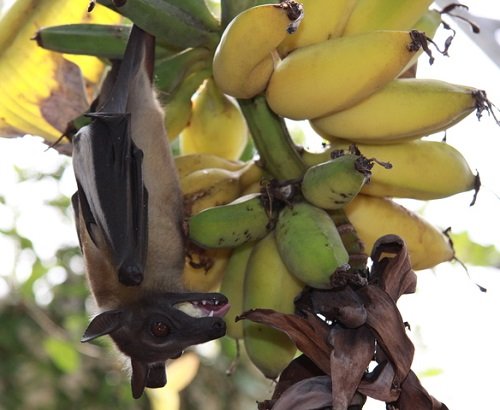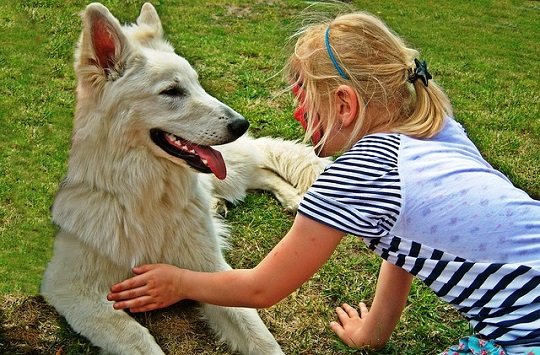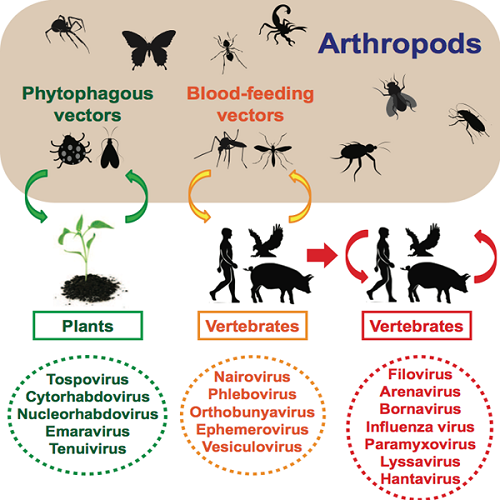
On the 22nd of May; 2018, at least ten people were reported dead in India following Nipah virus infection. Nipah virus is a member of the Paramyxovirus and has been identified previously in Kampung Sungai Nipah, Malaysia and Singapore in 1998 and 1999 respectively. In 2004, another outbreak occurred in Bangladesh and the most recent is the Indian case. Nipah virus disease has been identified as a zoonotic disease and the viral agent is capable of causing disease in pigs, some other domestic animals, while the fruits bats have been identified as the natural reservoir of this dangerous agent whom according to CDC has nospecific treatment for now.
Apart from Nipah virus, many more viral pathogens have been identified as agents that can be transferred from animals to humans. The disturbing part is that most of the diseases caused by these agents’ results to the death of scores of people. From 2015 till date, more than 50% of individuals suspected to have Ebola virus disease have died from the incidence.
Hmmm.... sometimes I ask myself if humans can survive without these animals, for a disease like Nipah virus disease that can affect domestic animals, do we really need to keep pets? I don’t keep pet but some people love to and I can’t ask them to stop, so what are the measures to be taken to stay safe with this pets around human. Before we answer these questions let me quickly describe some viral pathogens that have been reported as transferable from animals to humans.
B virus (Herpes B)
Although B virus infection caused by a herpes virus is rare in human, it does occur sometimes and the resulting effect is usually severe and serious. The virus is usually transmitted to humans through contact with body fluids of macaque monkey which is the primary reservoir of B virus. When humans are bitten or scratched by infected macaque monkey the virus is usually transferred resulting in acute neurological disease and fatal encephalitis after the incubation and multiplication of the virus in the host.
Rabies Virus
 )
)For those who love dogs, hunting or use dogs as security agents please beware of Rabies as death usually occur from the effect of rabies on the central nervous system, victims usually die after a few days of infection but the good news is that Rabies is preventable. If you can prevent your pets from exposure to this agent and vaccinate them appropriately, then you can be sure of avoiding this pathogen. Rabies is caused by the Rhabdovirus, the virus multiplies in the salivary gland of the host can be transmitted to man bitten by wild animals such as bats, foxes, skunks, racoons and dog.
Lassa virus
Lassa virus has been discussed previously in my post titled the increasing incidence of Lassa fever in Nigeria where I explained that Lassa virus can be transferred from animals (Rodents) to persons (zoonosis) and this can be achieved by Ingesting of the virus in food, contaminated utensils, contact with food contaminated with the rodent droppings or urine of infected multimammate rats (Mastomys natalensis) and contaminated house items. The aerosols in air contaminated with rodent excretions can also be inhaled leading Lassa fever.
Ebola virus
This virus was transferred to humans from wild animals (fruit bats, monkeys, Porcupines chimpanzees and gorillas) and it can be transmitted directly from an infected person to another, especially when an individual comes in contact with the secretions (e.g. sweats or saliva), the blood and other body fluids. Fruit bats are the natural reservoir of this virus.
Arbovirus
Arbovirus, also known as an arthropod-borne virus. I have nicknamed this group of viruses the “mosquito viruses” because it is usually transferred from mosquitoes to humans, although susceptible individual also acquires this pathogen from sexual intercourse (person to person transmission).

The tick is also a vector of the Arbovirus. Bunyaviruses, Reoviruses Togaviruses, and Flaviviruses are the families identified as Arboviruses. Examples of disease caused by Arbovirus includes the following:
- West Nile Virus
West Nile virus disease caused by the flavivirus and is spread by mosquitoes (Culex spp.) that pick up the virus after feeding on infected wild birds. Most people infected with the virus don't get sick but in the severe forms, West Nile virus affects the nervous system and may result in meningitis, encephalitis in older people, for young people with underlining diseases such as AIDS or diabetes it could result to chronic disease of the heart, liver or kidney and in the long run paralysis, or death.
- Zika Virus
Unlike the viruses mentioned previously, it is only on rare occasions that live threatening disease result from Zika virus infection. The first known reservoir of Zika virus is the monkey from whom the virus was identified in 1947(Uganda)
Avian Influenza
Avian influenza disease otherwise known as bird flu does not normally affect humans but for those who invest in poultry, the natural reservoir of influenza virus is the Wildwater bird and it can transmit the virus to other birds and then to people who are always in close contact with the poultry. This virus can be acquired by the ingestion of respiratory secretions that are contaminated with the virus.
Since it is practically impossible to separate animals from humans and I won't preach nor support the eradication of animals from our environment but we need to educate ourselves about how to avoid the spread of infection from our animal friends to the human population.
Staying safe around your pets and another animal.
- Washing hands rightly.
During the last Ebola Virus disease outbreak in Nigeria washing of hands became very important to everyone including pupils in schools but it is fast becoming a thing of the past, most people no longer remember to wash their hands especially after the visit to places that expose us to animals and pets. It is important that we wash our hands properly using appropriate technique. You can click here to learn more about appropriate hand washing.
- Avoid bites and scratches from arthropods and animals
Those who hunt for animals should avoid being bitten or scratched by either wild or domestic animals. For individuals in areas where Zika virus or Arbovirus disease have been recorded should avoid being bitten by mosquitoes, fleas and ticks. The use of mosquitoes nest might also be of help.
- Stay away from Rodents
As much as possible, individuals should try to stay in homes free from rodents. Food items can also be kept in a covered container to avoid be tampered with by rodents and situations where contamination has occurred the food should be thrown away.
- Handle and cook food properly
The need to handle our food properly and cooking at appropriate temperature cannot be overemphasised as this is one of the effective ways of destroying and eliminating pathogens.
Conclusively, as it is the case in any disease, individuals with compromised immunity, those with underlining disease, the elderly and children are more susceptible to zoonotic infection than healthy people. For the infection to occur the environment must be conducive, the disease agent must be invasive (In this case the virus) and this can be achieved through the bite by an insect, a mosquito, a tick, a flea or scratches of wild animals.
The viral agent can also be transferred when individuals are exposed to the blood, urine, saliva, mucous and other body fluids of an animal that is infected with the agent. Contaminated food and water can also be the reservoir of infection, so we have to be careful not to consume meat or eggs that are not properly cooked, drinking milk that is not pasteurized or eating raw fruits and vegetables.
Thank you for reading.
References
- https://www.cdc.gov/onehealth/basics/zoonotic-diseases.html
- https://www.aljazeera.com/news/2018/05/deadly-nipah-virus-claims-lives-india-180528062759101.html
- http://www.who.int/csr/disease/nipah/en/
- http://www.who.int/news-room/fact-sheets/detail/nipah-virus
- http://www.who.int/news-room/fact-sheets/detail/ebola-virus-disease
- https://www.cdc.gov/flu/avianflu/index.htm
If you write STEM (Science, Technology, Engineering, and Mathematics) related posts, consider joining #steemSTEM on discord here. You can also check this blog post by @steemstem here and this guidelines here for help on how to be a member of @steemstem. Please take a step further to also check this blog post from @steemstem on proper use of images devoid of copyright issues here

Hi @ugonma!
Your post was upvoted by utopian.io in cooperation with steemstem - supporting knowledge, innovation and technological advancement on the Steem Blockchain.
Contribute to Open Source with utopian.io
Learn how to contribute on our website and join the new open source economy.
Want to chat? Join the Utopian Community on Discord https://discord.gg/h52nFrV
This is a scary stat
I intend to get a pet dog real soon (a Siberian Husky to be precise) but this post is giving me second thoughts about my decision.
Anyways, thanks for sharing such an educative and highly informative post...
@agbona please don't be scared, the intention of this post was for us to be informed about how to stay safe around our pets. You can get your dog, just make sure the dog is vaccinated and prevent the dog from exposure to pathogens.
Thank you for reading.
Absolutely!
I might have been a bit loose with my pet when I was younger. Jimmy was the dog's name. It would chase me and put his paws on my hands and all that and it appeared fine. Years later, I got to realize this was a wrong practice, especially when I'd eat snacks almost immediately after play. Crazy times. I felt his post is really valid, since it creates awareness on how we should relate with animals. As friendly as they come, there could be consequences. Let's be safe.
Thank you @pangoli for reading and commenting.
You're welcome. :-)